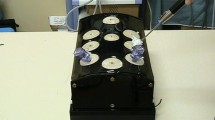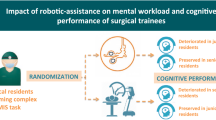Abstract
Background
Attention is important for the skilful execution of surgery. The surgeon’s attention during surgery is divided between surgery and outside distractions. The effect of this divided attention has not been well studied previously. We aimed to compare the effect of dividing attention of novices and experts on a laparoscopic task performance.
Methods
Following ethical approval, 25 novices and 9 expert surgeons performed a standardised peg transfer task in a laboratory setup under three randomly assigned conditions: silent as control condition and two standardised auditory distracting tasks requiring response (easy and difficult) as study conditions. Human reliability assessment was used for surgical task analysis. Primary outcome measures were correct auditory responses, task time, number of surgical errors and instrument movements. Secondary outcome measures included error rate, error probability and hand specific differences. Non-parametric statistics were used for data analysis.
Results
21109 movements and 9036 total errors were analysed. Novices had increased mean task completion time (seconds) (171 ± 44SD vs. 149 ± 34, p < 0.05), number of total movements (227 ± 27 vs. 213 ± 26, p < 0.05) and number of errors (127 ± 51 vs. 96 ± 28, p < 0.05) during difficult study conditions compared to control. The correct responses to auditory stimuli were less frequent in experts (68 %) compared to novices (80 %). There was a positive correlation between error rate and error probability in novices (r 2 = 0.533, p < 0.05) but not in experts (r 2 = 0.346, p > 0.05).
Conclusion
Divided attention conditions in theatre environment require careful consideration during surgical training as the junior surgeons are less able to focus their attention during these conditions.



Similar content being viewed by others
References
Hall JC, Ellis C, Hamdorf J (2003) Surgeons and cognitive processes. Br J Surg 90:10–16
Berguer R, Smith WD, Chung YH (2001) Performing laparoscopic surgery is significantly more stressful for the surgeon than open surgery. Surg Endosc 15:1204–1207
Arora S, Sevdalis N, Aggarwal R, Sirimanna P, Darzi A, Kneebone R (2010) Stress impairs psychomotor performance in novice laparoscopic surgeons. Surg Endosc 24:2588–2593
Carswell CM, Clarke D, Seales WB (2005) Assessing mental workload during laparoscopic surgery. Surg Innov 12:80–90
Proctor RW, Dutta A (1995) Skill acquisition and human performance. SAGE publications, California
Hsu KE, Man FY, Gizicki RA, Feldman LS, Fried GM (2008) Experienced surgeons can do more than one thing at a time: effect of distraction on performance of a simple laparoscopic and cognitive task by experienced and novice surgeons. Surg Endosc 22:196–201
Webster JL, Cao CGL. Divided Attention in Using Robotic Surgical Systems. Proceedings of the Human Factors and Ergonomics Society Annual Meeting, 2004, vol 48. pp 1751–1754
Meneghetti AT, Pachev G, Zheng B, Panton ON, Qayumi K (2012) Objective assessment of laparoscopic skills: dual-task approach. Surg Innov 19:452–459
Slagle JM, Weinger MB (2009) Effects of intraoperative reading on vigilance and workload during anesthesia care in an academic medical center. Anesthesiology 110:275–283
MANUAL (2012) FLS manual. http://www.flsprogram.org/wp-content/uploads/2013/01/Manual-Skills-Guidelines-2012.pdf. Accessed 5 Sep 2012
Cuschieri A (2000) Human reliability assessment in surgery–a new approach for improving surgical performance and clinical outcome. Ann R Coll Surg Engl 82:83–87
Moorthy K, Munz Y, Dosis A, Bann S, Darzi A (2003) The effect of stress-inducing conditions on the performance of a laparoscopic task. Surg Endosc 17:1481–1484
Moorthy K, Munz Y, Undre S, Darzi A (2004) Objective evaluation of the effect of noise on the performance of a complex laparoscopic task. Surgery 136:25–30 (discussion 31)
Paschler H, Johnston JC, Ruthruff E (2001) Attention and performance. Annu Rev Psychol 52:629–651
Skinner A, Auner G, Meadors M, Sebrechts M (2013) Ambidexterity in laparoscopic surgical skills training. Stud Health Technol Inform. 184:412–416
Disclosures
Mudassar Ali Ghazanfar, Malcolm Cook, Benjie Tang, Iain Tait and Afshin Alijani have no conflicts of interest or financial ties to disclose.
Author information
Authors and Affiliations
Corresponding author
Rights and permissions
About this article
Cite this article
Ghazanfar, M.A., Cook, M., Tang, B. et al. The effect of divided attention on novices and experts in laparoscopic task performance. Surg Endosc 29, 614–619 (2015). https://doi.org/10.1007/s00464-014-3708-2
Received:
Accepted:
Published:
Issue Date:
DOI: https://doi.org/10.1007/s00464-014-3708-2




